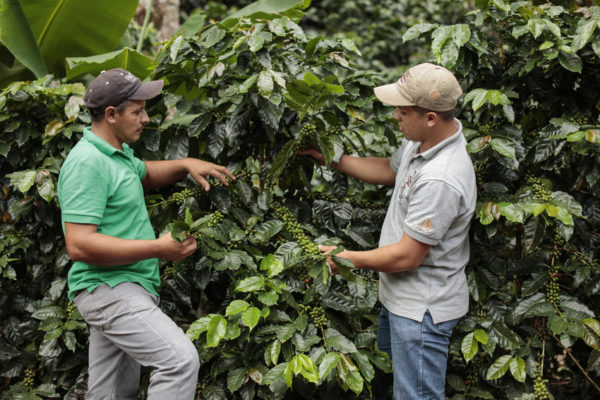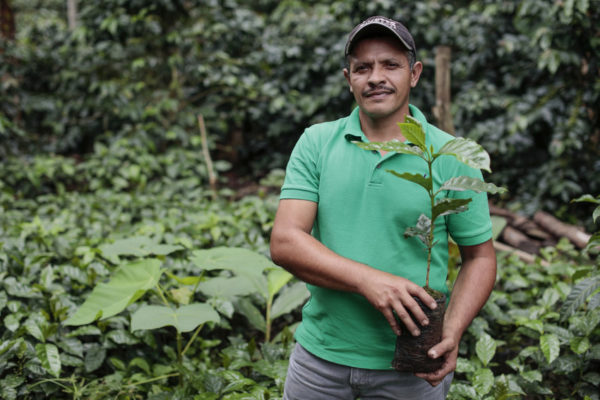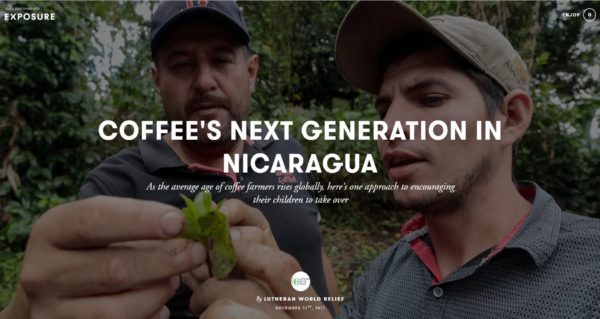Several times a week, Maryeli Lopez, 22, hops on her motorcycle and drives down the hill from her family’s mountainside coffee farm in the northern Nicaragua region of Jinotega to visit her neighbors.
She’s not paying a social call.
Rather, she travels to neighboring coffee farms to pass along information about growing techniques, plant diseases and environmental practices to help farmers produce high-quality beans that help them merit coveted industry certifications — such as those designating organic, Direct Trade and sustainably-produced coffee — that will bring them a higher price for their harvest.
A journey for improvement
Maryeli is one of 60 young people working as outreach promoters, a kind of agricultural extension agent, who are key to improving not only the farmers’ coffee crops but also the lives of their families and communities. And all of it is funded by the company that buys the growers’ product: Farmer Brothers, a U.S. coffee roaster, wholesaler and distributor of coffee, tea and culinary products.
The Direct Trade Verified Sustainable program, which has a goal of improving the food security and income of 350 farm families who supply Farmer Brothers coffee, is being carried out by Lutheran World Relief through the local farmers’ cooperative, Aldea Global.
“This program represents a buying philosophy and a journey for improvement,” said Molly Laverty, Farmer Brothers’ director of sustainability. “The premium added to the coffee is invested in the coffee-growing communities, based on data measured in the field by a third party and the opinion of the coffee growers about their priorities. The goal is to foster vibrant and viable communities that generate a long-term assured supply of high quality coffee.”
Carrying on the legacy of coffee

Most outreach promoters like Maryeli are the children of coffee farmers. They receive specialized training in coffee cultivation from a professional agronomist, including crop management, how to prevent and treat plant diseases, environmentally friendly farming practices and ways to ensure their families have a sufficient and nutritious diet. They learn how to test the soil and how to estimate a particular farm’s harvest. They then pass that learning to the 20 to 40 farmers assigned to each promoter, making it an efficient – and cost-effective – way to convey technical information to a large number of coffee producers.
This program offers youth an opportunity to earn a living while maintaining roots in their community.
“We are eager to create more employment for the youth,” said Marvin Chavarria, executive of the Aldea Global Foundation. “There are lots of examples of sons and daughters of coffee farmers who finish high school, they go and study for their degrees, they go back to the farm, and they don’t have opportunities.”
He’s talking about people like Elkin Gonzalez, 23, who earned a degree in accounting, returned to his community and now works as one of the outreach promoters. “I really like the idea of sharing my experience with other small farmers,” says Gonzalez, who now has his own 8-acre plot to farm.
Farmers say they like working with people they know – the promoters are assigned to farmers in their immediate area – and are beginning to see the practices they’re learning pay off.

Norland Antonio Blandon, who lives with his wife and three children on a tidy 12-acre farm tucked in valley in the small community of Pantasma La Virgen, says his conversations with Elkin, his assigned promoter, made him realize he was engaging in poor environmental practices that were affecting others. It was a common practice for him and his neighbors to dispose of the wastewater from coffee washing, which contained pulp and other organic matter, into the stream at the bottom of the hill. He was inadvertently polluting the stream that those living downstream use for bathing and other purposes. These days, he separates out the pulp, which is used as a fertilizer in his coffee seedling nursery, and deposits the remaining water into a filtration trench, where it will seep into the earth.
Norland is especially excited about a recent training he received on the proper use of fertilizer that made him realize he had been wasting money with little result. He described it as a breakthrough and is anticipating better coffee production in the future.
Outreach promoters visit their farmers at least twice a month and have two trainings a month they must attend in the town of Jinotega, which in the case of some, like Maryeli, takes two hours or more to reach via the mountainous terrain by truck, bus or in her case, motorcycle. In her case, the project has inspired her to pursue a four-year technical degree: in agronomy, of course. With youthful enthusiasm, she clearly sees the road ahead.
“I’d like to have a farm of my own,” she says. “And run it by myself.”
Photo Story: "Coffee's Next Generation in Nicaragua"
Click on the image below to meet other outreach promoters and coffee farmers participating in this project:



